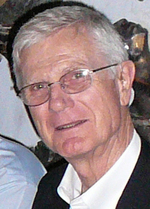A Dialogue on the Israeli–Palestinian Peace Process
David Makovsky, John Murray and James McCormick
Tuesday, 05 Apr 2011 at 8:00 pm – Great Hall, Memorial Union
David Makovsky is the Ziegler Distinguished Fellow at the Washington Institute and director of its Project on the Middle East Peace Process. Before joining The Washington Institute, Makovsky was a journalist based in Israel for many years covering the peace process. He is the former executive editor of the Jerusalem Post, was diplomatic correspondent for Israel's leading daily, Haaretz, and served for eleven years as the U.S. News and World Report Jerusalem correspondent. His many publications include Making Peace with the PLO: The Rabin Government's Road to the Oslo Accord and Myths, Illusions, and Peace: Finding a New Direction for America in the Middle East.John Murray, who since 2002 served as external adviser to the Palestinian Negotiation Support Unit, a legal and policy unit supporting the Palestinian negotiating team. He was previously associate director of the Program on the Analysis and Resolution of Conflicts at The Maxwell School, Syracuse University. Murray taught international law and negotiation at the American University in Cairo, Egypt, during the 1990s, and from 1973-82 served three terms as an Iowa State Senator from the Ames district.
James McCormick, Professor and Chair of the Iowa State Political Science Department, will moderate.
Part of the World Affairs Series.
Davide Makovsky Bio
David Makovsky is the author or coauthor of a variety of Washington Institute monographs on issues related to the Middle East Peace Process and the Arab-Israeli conflict, including Lessons and Implications of the Israel-Hizballah War: A Preliminary Assessment (2006); Olmert's Unilateral Option: An Early Assessment (2006); Hamas Triumphant (2006); Engagement Through Disengagement: Gaza and the Potential for Israeli-Palestinian Peacemaking (2005); and A Defensible Fence: Fighting Terror and Enabling a Two State Solution (2004), which focuses on Israel's security barrier and its relationship to demography and geography in the West Bank. In July 1994, with the personal intervention of then Secretary of State Warren Christopher, Makovsky became the first journalist writing for an Israeli publication to visit Damascus. In March 1995, again with assistance from U.S. officials, Makovsky was given unprecedented permission to file reports from Jeddah, Saudi Arabia, for an Israeli publication. Makovsky received a bachelor's degree from Columbia University and a master's degree in Middle East studies from Harvard University. He is an adjunct lecturer in Middle Eastern studies at Johns Hopkins University's Paul H. Nitze School of Advanced International Studies (SAIS). He is a member of the Council on Foreign Relations and the London-based International Institute for Strategic Studies.
John Murray Bio
John Murray specializes in training and coaching individuals in public and non-governmental organizations as they address communal conflict, with particular attention to water and other natural resource concerns. He currently provides long-term assistance to the Palestinian Negotiation Support Unit and offers training in negotiation and communication skills to students and professionals from the Middle East region.
In addition to his consulting work, Murray teaches international conflict management at Johns Hopkins University's School for Advanced International Studies (SAIS). Murray's background includes military service, state-level elective office, law and education. He retired in 2005 as Professor of Practice in International Relations at the Maxwell School of Syracuse University and Associate Director of Maxwell's Program on the Analysis and Resolution of Conflicts (PARC). Prior to teaching at Syracuse, Murray taught conflict management and international law at the American University in Cairo, Egypt, and before that, at Texas Tech School of Law. He also founded and served as president of the Conflict Clinic, Inc., a negotiation and mediation firm established with the support of the Harvard Negotiation Project.
Murray received a BA from Cornell University, a Master's Degree in Public Law and Government from Columbia University, and a JD from the University of Iowa College of Law, where he served as Editor-in-Chief of the Iowa Law Review.
----
This lecture was made possible in part by the generosity of F. Wendell Miller, who left his entire estate jointly to Iowa State University and the University of Iowa. Mr. Miller, who died in 1995 at age 97, was born in Altoona, Illinois, grew up in Rockwell City, graduated from Grinnell College and Harvard Law School and practiced law in Des Moines and Chicago before returning to Rockwell City to manage his family's farm holdings and to practice law. His will helped to establish the F. Wendell Miller Trust, the annual earnings on which, in part, helped to support this activity.
Cosponsored By:
- International Studies Program
- LAS Miller Lecture Funds
- World Affairs
- Committee on Lectures (funded by Student Government)
Stay for the entire event, including the brief question-and-answer session that follows the formal presentation. Most events run 75 minutes.
Sign-ins are after the event concludes. For lectures in the Memorial Union, go to the information desk in the Main Lounge. In other academic buildings, look for signage outside the auditorium.
Lecture Etiquette
- Stay for the entire lecture and the brief audience Q&A. If a student needs to leave early, he or she should sit near the back and exit discreetly.
- Do not bring food or uncovered drinks into the lecture.
- Check with Lectures staff before taking photographs or recording any portion of the event. There are often restrictions. Cell phones, tablets and laptops may be used to take notes or for class assignments.
- Keep questions or comments brief and concise to allow as many as possible.





